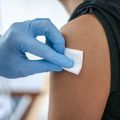
World Health Organization experts provide guidance on use of the Oxford vaccine
WHO SAGE says Oxford's coronavirus vaccine is safe and likely to be efficacious in older adults, and recommends its use in this age group.
Our vaccine work is progressing quickly. To ensure you have the latest information or to find out more about the trial, please visit the Oxford COVID-19 vaccine web hub or visit the COVID-19 trial website.
The World Health Organization (WHO) Strategic Advisory Group of Experts (SAGE) yesterday produced guidelines for the emergency use of the ChAdOx1 nCoV-19 coronavirus vaccine developed by the University of Oxford with its partner AstraZeneca.
The WHO has recommended that two standard doses of ChAdOx1 nCoV-19 be administered at an 8- to 12-week interval in people aged 18 years and older. This dosing regimen was shown in clinical trials to be safe and effective in preventing symptomatic COVID-19, with no severe cases and no hospitalisations from COVID-19 more than 14 days after the second dose.
The new guidance marks a key step towards the University and AstraZeneca’s goal of providing global access to the vaccine, which is being made available on a not-for-profit basis during the pandemic. The vaccine is easily manufactured, transported and stored at domestic fridge temperature (2-8 degrees C), so can be easily administered in existing healthcare settings, allowing for the vaccine to be deployed rapidly around the world.
Andrew Pollard, Professor of Paediatric Infection and Immunity, and Chief Investigator on the Oxford vaccine trial, said: ‘The new guidance from WHO is an important milestone in extending access to the Oxford-AZ vaccine to all corners of the world and providing further endorsement that after rigorous scrutiny by the WHO Strategic Advisory Group of Experts the vaccine can be used to help protect populations from the coronavirus pandemic.’
Sarah Gilbert, Professor of Vaccinology, and Chief Investigator on the Oxford vaccine trial, said: ‘It is excellent news that the WHO has recommended use of the SARS CoV-2 vaccine first produced in Oxford. This decision paves the way to more widespread use of the vaccine to protect people against COVID-19 and gain control of the pandemic.’
 Oxford and Liverpool join forces to tackle global challenges
Oxford and Liverpool join forces to tackle global challenges
 Expert Comment: Four years of full-scale war and Ukrainian resistance continues
Expert Comment: Four years of full-scale war and Ukrainian resistance continues
 New research shows high temperatures affect sex ratios at birth
New research shows high temperatures affect sex ratios at birth
 COVID-19 vaccination during pregnancy offers new insight into preeclampsia prevention
COVID-19 vaccination during pregnancy offers new insight into preeclampsia prevention